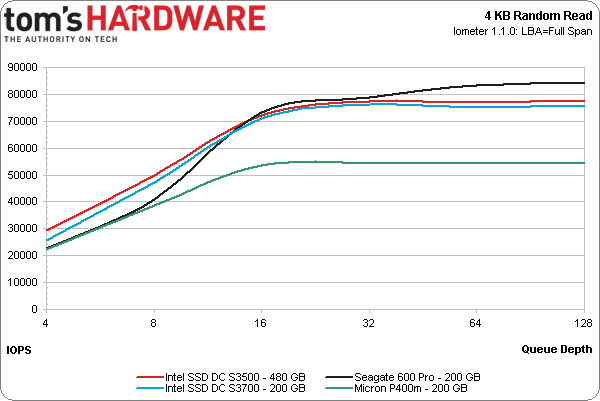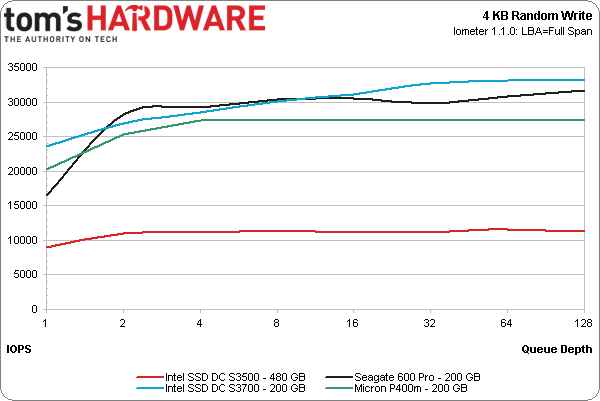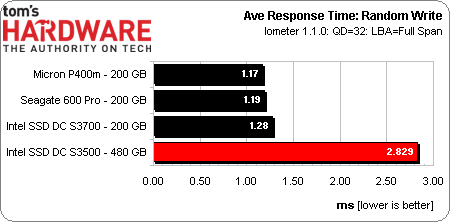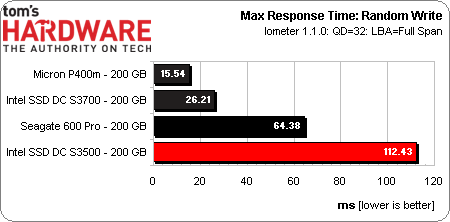The SSD DC S3500 Review: Intel's 6 Gb/s Controller And 20 nm NAND
As enterprise SSDs become more specialized and application-focused, Intel is hoping its SSD DC S3500 will strike a chord with customers looking for excellent read performance on a budget. We compare this drive to other notable contenders in its class.
Results: 4 KB Random Performance And Latency
We expect an SSD that exists for the sole purpose of serving up reads to do this job well in a random 4 KB read test. Intel's SSD DC S3500 does not disappoint. It matches the S3700 at every queue depth, eventually hitting 77,000 IOPS. That's not enough to knock Seagate's 600 Pro off its perch at queue depths above 16. Peaking at 84,000 IOPS, the 600 Pro still dominates this test.
Random 4 KB writes are much harder to interpret. The 600 Pro we recently reviewed was of the 200 GB variety, and its extra factory over-provisioning boosts random write performance by 3x. That also pushes price per gigabyte up to ~$1.60/GB, which is 33% higher than Intel's SSD DC S3500. We still don't have any of the non-over-provisioned 600 Pros to review, but those drives are more in line with the S 3500's pricing and are rated at 11,000 IOPS. At the end of the day, you get what you pay for. The 600 Pro family has an advantage in that you have an option to pay a little more per gigabyte and get a big boost in random write performance.
This made us wonder what would happen if we over-provisioned the SSD DC S3500 by an additional 20%? Would we see the additional gains that the 600 Pro achieves? The short answer is no. No matter what we did, we couldn't get much above 11,000 IOPS.
The average response time lines up perfectly with what we recorded for random 4 KB IOPS. And as with our IOPS measurement, the SSD DC S3500 trails the field by a fairly wide margin. A little more troubling was a maximum response time almost double that of the 600 Pro. Before we get too concerned, lets take a look at performance consistency and see if we have something to worry about.
Get Tom's Hardware's best news and in-depth reviews, straight to your inbox.
Current page: Results: 4 KB Random Performance And Latency
Prev Page Results: Write Endurance Next Page Results: Performance Consistency-
Mastle Hi, Think there's an error on page 1, $579 for 80GB drive......Surely won't be getting it at that price for my home build!Reply -
busuan Found myself suddenly losing interests in SATA SSDs after seeing the specs of PCIe SSD in the latest MBA refresh.Reply -
PapaCrazy An Intel 320 series SSD I put in my dad's computer just encountered the 8mb bug even though the firmware was updated with the "fixed" version. He uses the computer for business and I got him an Intel SSD thinking it'd be reliable. I think I'm gonna try Samsung next time around.Reply -
Evolution2001 Nitpicking here... but the article text is still wrong...or the math is. :pReply
''...we do know that the 800 GB model we're reviewing should run around $579. At ~$1.20/GB, ...''
800GB @ $1.20 = $960. -
drewriley Reply10952175 said:Nitpicking here... but the article text is still wrong...or the math is. :p
''...we do know that the 800 GB model we're reviewing should run around $579. At ~$1.20/GB, ...''
800GB @ $1.20 = $960.
Thanks, just can't seem to get the right combination of 4, 8 and 0. The 480GB version is $579 -
drewriley Reply10952165 said:An Intel 320 series SSD I put in my dad's computer just encountered the 8mb bug even though the firmware was updated with the "fixed" version. He uses the computer for business and I got him an Intel SSD thinking it'd be reliable. I think I'm gonna try Samsung next time around.
With the BAD_CTX_13X (8MB) failure, the fixed firmware fixed 'most' of them. The failure rates are quite low, especially after the FW 'fix', but if that one failure happens on the only drive you bought, it can really suck. As a consumer, I could care less if a million other people got a good SSD, if mine fails, I am upset. As an enterprise buyer, if one fails out a million, my company is throwing a party!
-
flong777 Why does Intel continue to release mediocre SSDs? Granted this performs middle of the pack but I just don't understand why a company with Intel's resources doesn't put out a top performer like the 840 Pro.Reply -
Grizely1 Reply10955531 said:Why does Intel continue to release mediocre SSDs? Granted this performs middle of the pack but I just don't understand why a company with Intel's resources doesn't put out a top performer like the 840 Pro.
Go back and read the article.
Or, learn the difference between consumer vs commercial. It's a DT (Data Center). -
flong777 Reply10959572 said:10955531 said:Why does Intel continue to release mediocre SSDs? Granted this performs middle of the pack but I just don't understand why a company with Intel's resources doesn't put out a top performer like the 840 Pro.
Go back and read the article.
Or, learn the difference between consumer vs commercial. It's a DT (Data Center).
Fair enough, I guess I should have been more clear. I don't understand why Intel is involved with so many mediocre SSDs - whether enterprise or consumer.
While I am not an enterprise user, I think I understand the basics. Enterprise SSDs are geared to handle heavy cues and write loads.
You have a point that it is not fair to compare enterprise with consumer - they are two different animals.



